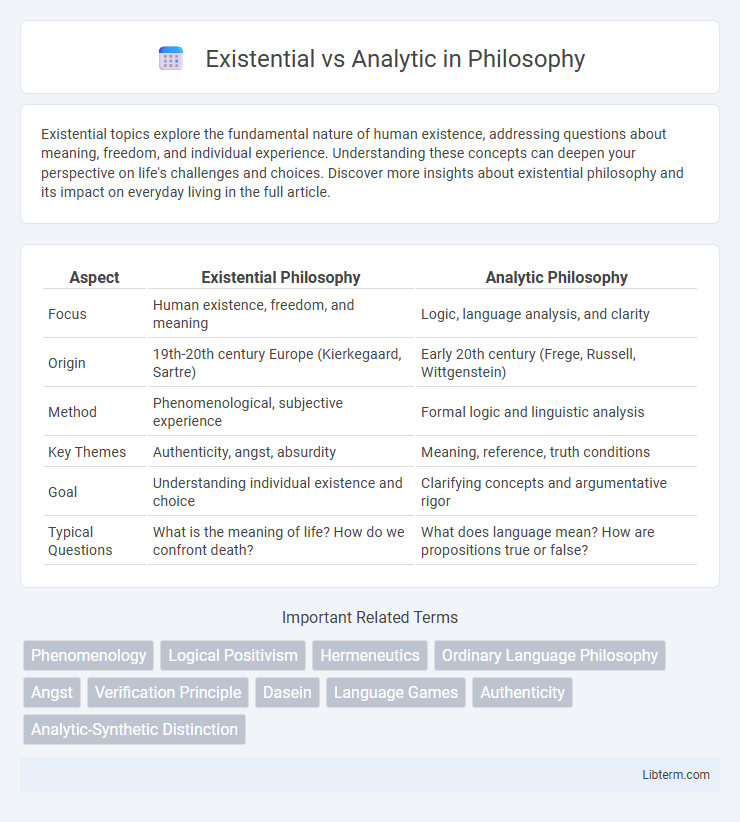Existential topics explore the fundamental nature of human existence, addressing questions about meaning, freedom, and individual experience. Understanding these concepts can deepen your perspective on life's challenges and choices. Discover more insights about existential philosophy and its impact on everyday living in the full article.
Table of Comparison
| Aspect | Existential Philosophy | Analytic Philosophy |
|---|---|---|
| Focus | Human existence, freedom, and meaning | Logic, language analysis, and clarity |
| Origin | 19th-20th century Europe (Kierkegaard, Sartre) | Early 20th century (Frege, Russell, Wittgenstein) |
| Method | Phenomenological, subjective experience | Formal logic and linguistic analysis |
| Key Themes | Authenticity, angst, absurdity | Meaning, reference, truth conditions |
| Goal | Understanding individual existence and choice | Clarifying concepts and argumentative rigor |
| Typical Questions | What is the meaning of life? How do we confront death? | What does language mean? How are propositions true or false? |
Introduction to Existential and Analytic Philosophies
Existential philosophy centers on individual freedom, choice, and the subjective experience of existence, emphasizing themes like angst, authenticity, and the search for meaning. Analytic philosophy prioritizes clarity, logical analysis, and the systematic evaluation of language and concepts, often focusing on epistemology, metaphysics, and the philosophy of science. Both traditions offer distinct methodologies: existentialism explores human experience from a phenomenological perspective, whereas analytic philosophy relies on formal logic and linguistic precision.
Historical Roots of Existentialism
Existentialism originated in the 19th and 20th centuries, drawing from the works of Soren Kierkegaard and Friedrich Nietzsche, who emphasized individual experience and subjective meaning. Unlike analytic philosophy, which focuses on logic and language analysis pioneered by philosophers like Bertrand Russell and Ludwig Wittgenstein, existentialism explores human existence, freedom, and authenticity. The historical roots of existentialism reflect a reaction against positivism and scientific rationalism, stressing human angst and the search for purpose in an absurd world.
Historical Foundations of Analytic Philosophy
Analytic philosophy originated in the early 20th century, deeply influenced by figures such as Gottlob Frege, Bertrand Russell, and Ludwig Wittgenstein, who emphasized logic, language, and clarity of argumentation. This tradition grew as a reaction against the existential focus on human experience and subjective meaning, prioritizing analysis of language and conceptual frameworks to address philosophical problems. The historical foundations of analytic philosophy lie in the development of formal logic and the philosophy of language, distinguishing it from existentialism's emphasis on individual existence and freedom.
Core Concepts in Existential Thought
Existential thought centers on core concepts such as existence preceding essence, emphasizing individual freedom, choice, and responsibility in shaping one's own life and identity. It explores themes of angst, absurdity, authenticity, and the confrontation with mortality, highlighting the subjective experience as fundamental to understanding human existence. This contrasts with analytic philosophy's focus on linguistic clarity and logical analysis rather than the lived human experience.
Key Principles of Analytic Philosophy
Analytic philosophy emphasizes clarity, logical rigor, and linguistic precision as key principles to address philosophical problems through formal logic and analysis of language. It prioritizes the decomposition of complex concepts into simpler components and relies on argumentation grounded in empirical data and scientific methodology. This approach contrasts with existentialism's focus on individual existence, subjective experience, and meaning.
Major Figures in Existentialism
Major figures in existentialism include Soren Kierkegaard, often regarded as the father of existential thought, Friedrich Nietzsche, who emphasized individualism and the will to power, and Jean-Paul Sartre, a key proponent of existentialism known for his concept of radical freedom and responsibility. Martin Heidegger contributed significantly with his analysis of being and existence in "Being and Time," while Simone de Beauvoir expanded existentialism through feminist philosophy. These thinkers primarily explore human existence, freedom, and authenticity, differing fundamentally from analytic philosophy's focus on logic and language analysis.
Leading Thinkers in Analytic Tradition
Leading thinkers in the Analytic tradition, such as Bertrand Russell, Ludwig Wittgenstein, and G.E. Moore, significantly shaped modern philosophy through rigorous logical analysis and emphasis on language clarity. Their work contrasted with the Existentialist focus on human experience by prioritizing precision in meaning and argument structure, which laid foundations for contemporary philosophy of language and mind. Analytic philosophy's methodical approach continues to influence areas like epistemology, metaphysics, and ethics through the development of formal logic and linguistic analysis.
Methodological Differences
Existential research employs qualitative methods such as phenomenological interviews and narrative analysis to explore human experience and meaning, emphasizing subjective understanding. Analytic research typically utilizes quantitative techniques, including hypothesis testing, statistical analysis, and logical argumentation, aiming for objective, generalizable results. The methodological divergence centers on existentialism's focus on individual context and essence versus analytic philosophy's emphasis on clarity, formal logic, and empirical verification.
Contemporary Relevance and Influence
Existential philosophy continues to influence contemporary thought by emphasizing individual freedom, authenticity, and the search for meaning in an increasingly complex world. Analytic philosophy maintains its dominance in modern academic discourse through its rigorous focus on logic, language, and scientific clarity, shaping fields such as linguistics, cognitive science, and artificial intelligence. The dynamic interplay between existential concerns and analytic precision drives ongoing debates in ethics, ontology, and epistemology, underscoring their lasting relevance across diverse intellectual domains.
Bridging Existential and Analytic Perspectives
Bridging existential and analytic perspectives involves integrating the existential emphasis on human experience, meaning, and authenticity with the analytic tradition's focus on logic, language analysis, and cognitive clarity. This approach leverages existential insights into subjective reality while applying analytic methods to improve conceptual precision and argumentative rigor. The synthesis fosters a more comprehensive understanding that addresses both the depth of lived experience and the structure of rational inquiry.
Existential Infographic

 libterm.com
libterm.com